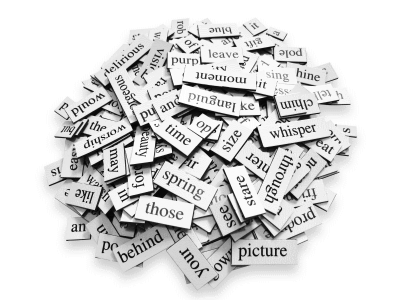Short words No. 1 predictor of readability
Pulitzer Prize-winning humorist Dave Barry spent eight years teaching businesspeople how to write better. As he told Time magazine:

“I’d lecture a bunch of chemists or engineers about the importance of not saying ‘It would be appreciated if you would contact the undersigned by telephone at your earliest possible convenience,’ and instead saying ‘Please call me as soon as you can.’ That was revealed wisdom to these people.”
Take a tip from Barry: Avoid multisyllabic exhibitions of verbosity. Use short words.
What’s wrong with long words?
Why avoid long words? Because they:
1. Slash readability.
Word length, along with sentence length, are the top two indicators of reading ease, writes readability expert William H. DuBay in Unlocking Language (PDF). For more than 80 years, researchers have proven in the lab — again and again — that short, simple words increase readability.
Here’s what the researchers found:
- Long words are harder to read. In 1928, Mabel Vogel and Carleton Washburne of Winnetka, Illinois, published 19 writing attributes that make messages harder to read. Of their 19 writing attributes that make messages harder to read, the top three centered on word familiarity.
- Vocabulary top predictor of difficulty. “Vocabulary load is the most important [accompaniment to] difficulty,” found Irving Lorge, a psychologist at Columbia University Teachers College, in 1944.
- Short, simple words boost readability. Shortening and simplifying words reduced the reading grade level from 11th to 5th in a 1981 study by researchers Thomas Duffy and Paula Kabance.
2. Reduce comprehension.
The shorter the words, the easier your copy is to read. Indeed, virtually every readability index uses word length as one measure of reading ease — or difficulty.
- Familiar words are easier to understand. Comprehension increases with word familiarity and ease, found readability researcher Ralph Ojemann in 1934. Word difficulty was among the top four factors he found that reduce understanding.
- Hard words reduce comprehension. The more difficult words a passage included, the harder it is to understand, found Ralph Tyler and Edgar Dale in 1934. The top two predictors of comprehension, they discovered, are the amount of jargon and the number of long or unfamiliar words.
- Common words boost understanding. Using only the percentage of common words and average number of words per sentence, Dale and Chall in 1948 published a readability formula that predicts comprehension with a 92% accuracy rate.
- One-syllable words increase comprehension. Shorter words increase understanding, found Edmund B. Coleman in his 1965 study measuring the percentage of one-syllable words.
- Word familiarity increases understanding. Word characteristics including functionality, familiarity and length affect comprehension, found readability expert G. R. Klare in a 1976 review of 36 readability studies.
As Skip Boyer, the late executive producer and director of executive communication at Best Western International Inc. wrote: “Readers may know that utilize means use and optimum means best. But why make them translate?”
3. Suck the color from your piece.
Small words are compelling, as well as clear, because they’re often concrete. That is, they describe things rather than ideas. That helps our readers visualize your information so they understand it faster and remember it longer.
Let’s test that: Which do you see? A visual-duration-sensing apparatus? Or a clock?
4. Sound stuffy and bureaucratic.
When a speechwriter for President Franklin D. Roosevelt wrote, “We are endeavoring to construct a more inclusive society,” FDR changed it to, “We’re going to make a country in which no one is left out.”
No wonder. Simpler words are more accessible — and less self-important.
Corporate communicator Chris Winters calls using stuffy, bureaucratic words the “Look, ma! I’m writing!” syndrome.
5. Don’t get shared.
The average length of a word in a tweet that gets retweeted is 1.62 syllables, according to a study by viral marketing scientist Dan Zarrella. Want to get the word out on Twitter? Use mostly one- and two-syllable words.
6. Make you sound pompous and dense.
Using stuffy words might make you sound stuffy. But it won’t make you sound smarter. In fact, people who use big words when smaller ones will do actually sound less intelligent, according to research at Stanford University.
7. Make you seem dishonest.
“The great enemy of clear language is insincerity,” wrote English novelist George Orwell in ‘Politics and the English Language.’ “When there is a gap between one’s real and one’s declared aims, one turns … instinctively to long words and exhausted idioms, like a cuttlefish squirting out ink.”
Orwell also wrote: “Words like phenomenon, element, individual (as noun), objective, categorical, effective, virtual, basic, primary, promote, constitute, exhibit, exploit, utilize, eliminate, liquidate, are used to dress up simple statements and give an air of scientific impartiality to biased judgments.”
Still writing “single-operation computer architecture unit of data bus”? Stop it.
Small wonder
“Sure,” you say, “Ann Wylie can write using mostly one- and two-syllable words. She has little ideas. But my big ideas can only be expressed in big words.”
But one of the biggest ideas in the history of our country was expressed in the Gettysburg Address. Of the 235 words Lincoln used in the Gettysburg Address (that’s fewer than the number on the back of a potato chip package today), 174 of them have only one syllable.
So we can express big ideas with small words. In fact, short words express ideas faster and to more people than long words.
And isn’t that what the best writers aim to do?

Leave a Reply